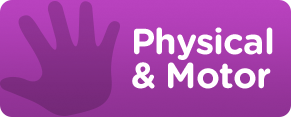Four is the age of “why” — when children begin thinking about the outside world and wonder how things work. Their mood swings have settled down, and attention spans are growing longer, so your preschooler can play in a calm and focused manner.
Here are some typical milestones you may see in your four-year-old:

Language & Cognitive Development
- Speaks in four to five word sentences and repeats a word with four syllables
- Knows names of familiar animals and common objects
- Sorts objects by shape or color
- Counts up to 10 and recognizes numerals from zero to nine
- Follows multi-step instructions (”Brush your teeth, pick a book and come to bed”)
- Distinguishes between the real world and the imaginary world
- Attempts reading and writing; enjoys stories and can connect them to their own life
- Notices rhyming sounds in words
- Knows the days of the week, months and seasons, but can’t tell time
- Asks lots of “why” questions

Physical & Motor Development
- Walks downstairs, alternating feet
- Runs smoothly; can gallop and skip on one foot
- Throws ball with transfer of weight on feet; catches using hands
- Smoothly rides a tricycle or bicycle with training wheels
- Dresses self (except for tying shoes)
- Pours from a small pitcher without spilling
- Tries to cut with blunt scissors
- Puts together a jigsaw puzzle with 4-12 pieces

Social & Emotional Development
- Talks to self while playing alone (”private speech”)
- Plays make-believe or enjoys dress-up and role playing (”mommy,” “daddy,” “teacher, ”astronaut”)
- Begins playing cooperatively with peers and will share when asked
- Likes to laugh and be silly
- Likes moderate rough-and-tumble play
- Understands difference between right and wrong
Remember your child is a wonderful, unique individual and may not exhibit every one of these milestones. A wide range of behaviors is considered normal and some children will demonstrate certain abilities earlier or later than this schedule. Should you have any concerns about your child’s progress, please ask your pediatrician or family physician.






